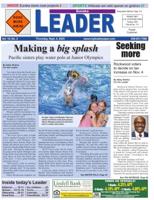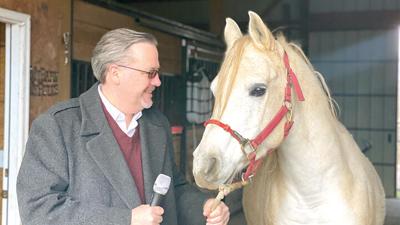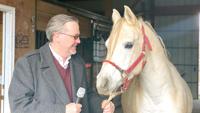A long-running radio program and podcast that’s heard by an estimated 3 million people each year originates weekly from an 80-acre ranch north of Hillsboro.
“White Horse Inn,” a weekly discussion of theological topics, has been on the air since 1990. Over the last few months, its host, Shane Rosenthal, has been overseeing the broadcast from his Hillsboro-area property.
“Not a lot of people know we’re here,” said Rosenthal, 56, who produced the program from the start and took over hosting duties earlier this year.
The show, originally helmed by Michael Horton, will surpass 1,550 episodes by the end of the year. It can be heard on more than 50 radio stations as well as in podcast form and on the whitehorseinn.org website.
“We’re on two stations in Canada and one in the Philippines,” Rosenthal said. “If you count only the podcasts, we know we get 20,000 downloads on an average week.”
Locally, the show can be heard on KFUO-AM in St. Louis.
On a recent week, the podcast was ranked in the top 50 among downloads on iTunes’ ranking of religious and spiritual podcasts, right up there with productions by Joyce Meyer, Rick Warren and Tony Evans.
Make no mistake, “White Horse Inn” isn’t designed and produced for a mass audience, but for those who want to analyze modern religion, its history and spirituality. The name of the program harkens back to the White Horse Inn, a tavern in Cambridge, England, where the English Reformation took root in the early 1500s.
“Our goal is to inform you on what you believe and why you believe it,” Rosenthal said. “We talk a lot about faith and modern culture. We believe a lot of forms of Christianity today need reform, that many churches today offer cotton-candy religion and entertainment.
“We’re kind of concerned that American Christianity is just about as confused as it was before the times of the Reformation,” he said.
A return to “that old-time religion?”
“I don’t think I’d call it old-time religion, in the terms that people understand old-time religion to mean about 100 years ago. We want to go back 2,000 years and look at the Bible texts in terms of how the Jews of the first century (A.D.) approached it.”
The program traditionally has been a round-table discussion among scholars, but since Rosenthal took over – just as the worldwide pandemic was settling in earlier this year – the format has changed.
“I used to go to California to put together the programs, but that’s not practical this year,” he said. “We can’t do roundtable discussions anymore, so I’m mainly discussing that week’s topic with one person, either over the phone or over a Zoom (video conference call),” he said.
Rosenthal discusses modern and historical theology with the likes of Oxford scholars and other prominent theologians.
“We’re doing a show soon on social media and television, and how technology has changed the way we think,” he said. “Today, we’re more interested in images than we are in text. How has that changed us, and how has that changed religion?”
Rosenthal said a companion show and podcast called “Core Christianity,” which he had a hand in developing, covers more of the basics.
“I’d say my show is more of on an intermediate to advanced level,” he said. “But when we’re discussing these topics, I try to keep it grounded and approachable for the audience.”
During December, the show is rerunning a series on the incarnation for Christmas – programs that Horton hosted.
Rosenthal has set up a link for Leader readers who wish to hear some of his shows at whitehorseinn.org/leader.
Originally from California, Rosenthal earned a bachelor’s degree in liberal studies from California State-Fullerton and a master’s degree in historical theology from Westminster Seminary California in Escondido.
“I was thinking at the time about pastoral work, but I discovered that I really enjoyed media and teaching,” he said.
Horton, the original host, was one of his instructors at Westminster and that connection led to Rosenthal becoming producer of “White Horse Inn.”
“At first, producing what was a live radio broadcast was doing things like lining up interviews, arranging the bumper (transition) music and taking phone calls from listeners. Over the years, we went away from the live element and there was a lot more writing, as in preparing questions, and editing the program,” he said.
After Horton decided to step down to concentrate on teaching, Rosenthal became the host but continued as producer.
“I’m kind of like the guy going around playing the kazoo and beating a drum at the same time,” he said.
Rosenthal and his wife, Heidi, and their four children moved to Hillsboro from Pennsylvania in 2008.
“She wanted to be closer to her family in Cape Girardeau, and her parents had a carrot they dangled in front of us – they had some investment property in Hillsboro they could let us have. We built a great house on it.
“The third floor is where my office is, and it’s a buffer from all the family noise and the dog barking when the Federal Express truck shows up,” he said.
“And we have, yes, white horses,” he said. “It’s kind of ironic that way.”




